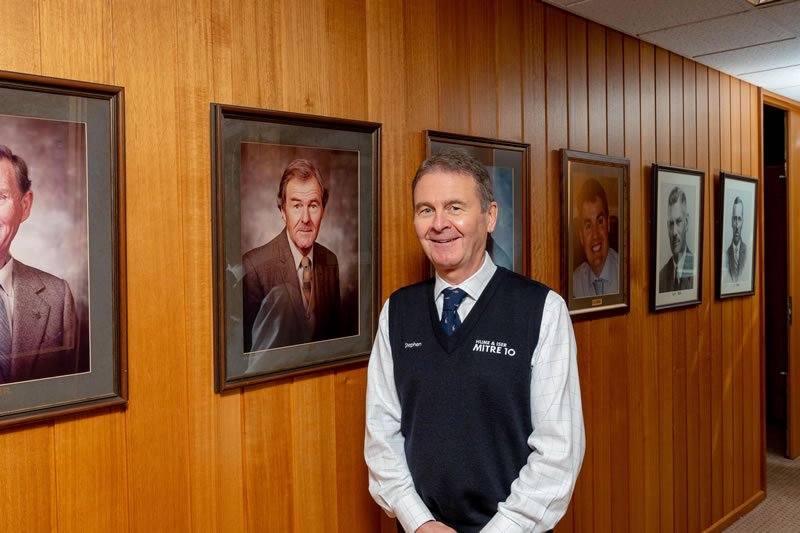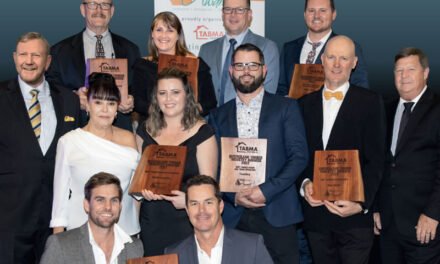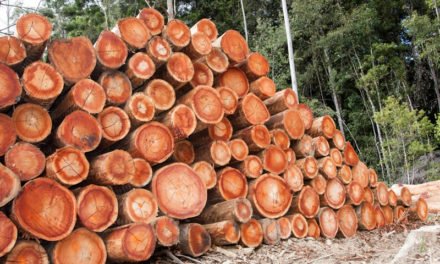Serving the growing regional centre of Bendigo for 140 years, Hume & Iser Mitre 10 has seen it all. Along the way, they’ve become a key part of local life for the growing city.
With much of Australia tightening belts due to Covid, Stephen Iser has the grace to sound a little embarrassed when he mentions that it’s been a very good period for Hume & Iser Mitre 10 in Bendigo. “Our business has just exploded,” he says. “People aren’t travelling, they aren’t going anywhere, they’re staying home and improving their houses, hence they’re coming to us.”
Of course, there have been a few changes to business as usual this year: sanitiser, plexiglass screens and social distancing are firmly in place and the local uni students who make up much of the casual staff are getting more shifts than usual. But overall, it’s been a surprisingly good year in the long story of Hume & Iser.
The company began supplying timber to the local goldfields in 1880. William Hümme, and Henry Iser were both from Hamburg, Germany and had come to Bendigo seeking prosperity. As the old adage has it, the safest gold business is supplying the miners, and their timber yard grew steadily through the years. In 1919 they incorporated, with a name change to Hume & Iser, a timely Anglicisation that helped again in World War II. Despite being immigrants, they were key parts of the local community and so escaped internment when many other German-Australians were locked up through the war years.
“You really wonder how they survived World War I and World War II so well, being Germans,” says Stephen. “We’re really fortunate that we’re still here, making it through two world wars and the Depression, then more recently the GFC.”
By the early 1980s, Stephen was working for the business – run by a family Board of Directors – and it had become a trade-specialist timber supplier. “That was when we made our first entry into a buying group,” he says, “joining John Danks & Son as part of Pro Timber and Hardware. Before that we purchased from wholesalers in Melbourne.
“The group had a catalogue. We’d never been in a catalogue before, and it was new to Bendigo, too. That hardware group was still primarily trade based and lasted for about five years then merged into the Homesaver Hardware Group, which became Home Timber & Hardware.”
With each step and year, Hume & Iser incrementally grew the retail side of the business, until it accounted for about 50% of its turnover. Then, in 2018, it was the first Home store to undergo the Mitre 10 Sapphire transformation program within the newly formed Independent Hardware Group.
Going Sapphire
The Sapphire program is a joint investment between IHG and stores, focusing on core retailing disciplines such as service, price, range, standards and convenience, alongside operational and business improvement initiatives. The strategy is designed to create the ‘best store in town’ and build long-term viability for the business owner. The board and store team embraced this challenge. “We spent a considerable amount of money redeveloping parts of the business, from the retail shop floor all the way through to our trade yard,” Stephen says. “We took on all the Sapphire team’s advice and expertise and quite frankly, we’ve never looked back.
“There’s been a massive response from our customers. Especially on the trade side. We can fit more product in a smaller area and it’s better laid out with a better flow. We combined our trade timber and trade hardware areas into one trade hub, which makes things much easier for the builder.”
Previously, timber was racked by hand, now a forklift does the job directly, both saving on labour and reducing the stress on staff. The whole operation has also moved undercover, which everyone appreciates.
“For our builder customers, we also have an offsite plaster distribution centre,” Stephen says. “We deliver from there out to builders and plaster sheeters: mouldings and boards, including specialty boards such as fire retardant and wet area boards. It helps with the trade package we can offer – they can order all their framing products and their plasterboard and we deliver at each step.”
Deliveries are done using a small fleet of 3-4T trucks and utes. “We’re just about to receive a 6T crane truck for the trade,” says Stephen. “It has a crane behind the cabin and delivers material onto site without having to hand unload it or tip it. The group’s also introduced Truck Tracker, which helps to organise deliveries more efficiently. One of the advantages of this system is that when we deliver to a site, we take photos. If there’s a dispute because something was left unattended and taken, we can just send the photos and that cuts out the back and forth. It’s a great development from IHG.”
Stephen and his management team are also keen contributors to the IHG network, participating in regional and national information exchanges as well as the annual Expo. “The good thing about the Expos is that we can talk with everyone and share ideas and thoughts,” he says. “As we’re all independent, we can change the direction of our businesses at the drop of a hat, unlike our major corporate competitors. If I find a product I think would work for our clients today, I can have it in the store tomorrow.”
IHG member discussion sessions where owners and managers talk about the success or otherwise of store initiatives are also favourites. “We can apply lessons to our own businesses if they look suitable,” Stephen says. “We give talks, too. Some of our delivery structure has been shared widely, especially how we pick orders and get them out to the client. We’ve also had success with marketing events: trade expos and Ladies Nights where we teach techniques and do familiarisations, and garden nights and other information events. We show how successful they’ve been and we share our results.”
Community focused
Stephen’s genuine love for Bendigo shines through in any conversation, and he’s thrilled the city is currently booming. “I think with this virus people have rethought what their life’s all about, and for many people, that’s meant getting out of the city,” he says. “The real estate agents here are being run off their feet. If you’re in Melbourne your house might be worth around $1 million. Sell that and move here and you can buy a palace. If you can work from home most of the time, from the outskirts of Bendigo to the northern suburbs of Melbourne is 90 minutes, and that’s not far for an occasional meeting!”
It’s a love that stretches back through generations. Stephen’s great-uncle Les was famous as a local benefactor. “He fought in WWI,” says Stephen. “He never married, but we know of a lot of families he looked after and he probably helped out ten times more who we never knew about: clothed them, fed them, everything. A lot of people still remember those days.”
It’s a tradition the company upholds with a raft of sponsorships for local schools and sports teams. “We try to do as much as we can in a diverse way,” Stephen says. “Even some equestrian and motorbike sponsorships. As a young boy I had three sisters who did show jumping and I was dragged to events every Sunday and I hated it, so I’ve been scarred. But those kids still need support! And that contact came from someone I’d met at Bendigo Pony Club 40-odd years ago.”
The store is a significant local employer, with some 90 people on the payroll, including a core staff of category experts ranging from experienced tradies and specialised paint staff to horticulturalists in the garden centre. “They’re all people who know the industry,” says Stephen. “Pretty much all our staff are specialists aside from the casuals we put on for peak periods, who are often uni students, but even they learn as they go along.”
Coming up
Over the business’s long history, the only constant has been change. Retail requests are likely to come from Instagram or an episode of The Block these days, and Spring in Bendigo on the back of the Covid DIY boom has seen some weekends so busy it’s been difficult to handle. But Stephen is all-too aware that the current recession could bite hard as locals’ savings are exhausted.
“I’ve got faith in government to stimulate our economy by throwing a lot of money at the building industry, because they know that if the building industry is healthy, it stimulates the broader economy,” he says. “Federal and State governments are pumping billions into infrastructure, with a lot of that in building. If retail goes quiet, we’ll just contract to try and deal with it. The trade will pick up, so we’ll cut our cloth to suit as best we can.”
One change he has more control over is retirement in the next year or two. Right now, there is no family member waiting in the wings. “I’ve got two children, my son’s a builder and my daughter works in finance. They’ve both got young families and their own careers, so we’re having that discussion about what comes next with the Board.”
Eager to protect his staff’s future as well as see the business continue, he’s finalising options, including bringing in a CEO able to work with the Iser Board. “I’ve spoken to the Group about it – they’ve got a lot of talented people in the network and could put someone in tomorrow who would do a great job,” Stephen says. “I live in Bendigo, so I’ll be here as a sounding board if they need it.”
Having grown up in the business, Stephen is passionate about its future. “Some of our biggest accounts are my best friends,” he says. “We work together and then we catch up on the weekends. And then there are the staff. We try to run a business that everyone is happy in, where everyone has a role and is respected and looked after. It’s not too hard to do, but a lot of people don’t get it right. I’m confident that whoever is in this role next will maintain that, because it’s the key to the business’s success.”
Image: Stephen Iser, managing director of Hume & Iser Mitre 10 in Bendigo. The family business is celebrating its 140th birthday this year.












